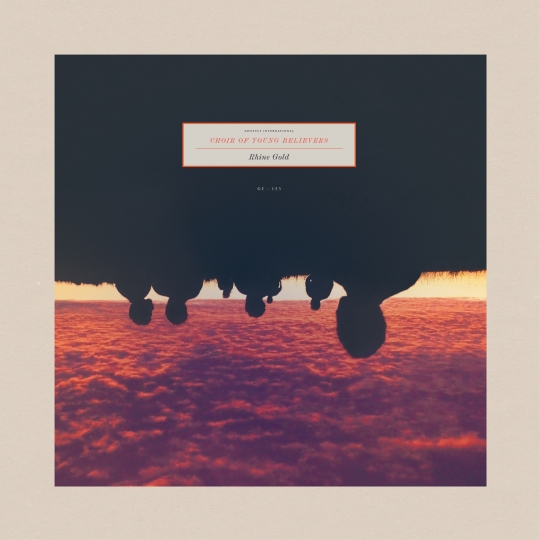We should hope that Denmark’s Choir Of Young Believers haven’t arrived a few years too late. The idea of such beautifully melancholy vocals backed by continuously ‘epic’ arrangements may sound a little formulaic in 2012, following the well received and wildly ubiquitous releases from Fleet Foxes and Bon Iver in recent years. The backlash towards such widescreen ambitions has begun to bite in certain quarters, but it would be a disservice to level any accusations of cynicism at a band already so wildly acclaimed in their homeland; this is by no means a group going for the jugular of mainstream success. Since only three of the nine songs clock in at sub-six minutes, this choir are unlikely to step into our wider consciousness just yet. That’s probably a good thing. It should see them avoid any misplaced criticism, deflected from the ‘over-exposure’ of (at first-glance) similar bands.
The vision of former Lake Placid man Jannis Noya Makrigiannis, Choir Of Young Believers arrived in 2007. Their debut, This Is for the White in Your Eyes, arrived the following year, earning the group the title of ‘Best New Band’ at the Danish Music Awards in 2009. The 11-piece tread similar ground to their debut on Rhine Gold, but by better utilising Makrigiannis’ acute compositional awareness and soaring vocals, their unique brand of stadium-sized atmospherics feels more fully realised and is allowed more space to grow. The album has its own, fully-formed personality: slow, methodical, and brooding. The careful attention which allows these 54 minutes of complex ideas enough breathing space deserves recognition; as does their tendency to confound expectations, often mid-song.
It’s abundantly clear from the off that their successes in Denmark have given the band free reign over proceedings. Before, it would be easy to accuse the group of being a backing band, or a ‘project’. Now though, they work as one, delicately ebbing and flowing from one genre to another. This togetherness and renewed ambition yields an album which combines shiny Americana with orchestral chamber-pop, effortlessly gliding between Krautrock, balladry and traditional folk music in the process. With such a grandiose voice at the fore, and touching upon such disparate styles, production is crucial to Rhine Gold’s success. The band have succeeded in enveloping the record with a slightly stifled haze, which It never quite escapes, despite the range of songs on offer. Many of the tracks lollop along, and this slow pace allows real evolution of every groove and complex melody; at times the music almost reluctantly leaves the speaker, forcing you to take notice without brashly announcing itself. The still, minute-long drone which opens the album swirls low into the mix beneath the vocals, and remains. This ever-present ethereal hum gives each song both unity and character, without often seeping into view above the delicate melodies. This can be an incredibly arresting tactic at times, and it sets the group apart from their ‘hymnal’ peers.
Opener “The Third Time” is a confident, seven minute groove which develops into an atmospheric swirl, built around oriental brass and a cute piano line. However, while the opener soothes you almost into a stupor, the offbeat lead single, “Patricia’s Thirst” offers a louder, funk-pop burst of energy. The dark guitar lines and synths combine to form the most fully realised ‘80s majesty of the record. Makrigiannis, it seems, is a fan of the grand arrangements of the decade, as many of the choruses on Rhine Gold belong in the ‘ever so slightly over the top’ bracket. They suit the scale of the band, but at times the overegging can feel a little tacked on top. Quiet-loud dynamics seem just a little obvious for a band with such a unique style, and this isn’t helped by overly glossy production at times.
Having said that, the album’s two centrepieces, “Paralyse” and “Have I Ever Truly Been Here,” are utterly hypnotic; the former a motorik monster over ten minutes in length, the latter an epic tug at the heartstrings and one of the few times the vocals really attack you from the speakers. Seamlessly seguing the listener from an intense Krautrock hypnosis into raw emotional wreckage is no mean feat, and the swift wrong-foot is achieved with a warped and scratchy acoustic interlude, effectively a pause before Side B. “…Been Here,” conversely, is as raw and emotive as anything I’ve heard this year. Dissecting a break-up with stark couplets: ‘I wanted you to know, I could never let it go’, and some abstract electronics, it is a moment of majesty. This middle third is the standout portion of the album, and elevates what could be received by some as plodding soundtracks into a more accessible dimension entirely.
It’s a shame the rest of Rhine Gold doesn’t quite live up to its truly brilliant middle portion. Brilliantly sequenced and realised though it is, the album only just manages to keep the attention for its 54 minutes, meaning first-time listeners could be put off by the sparse arrangements and slow pace. These are not songs to walk around to or talk over – they’re decadent, indulgent, and built for bedroom listening. A few tracks, most notably “Sedated” and “Paint New Horrors,” lack the complexity and invention on offer elsewhere. The strength of the opener and the excellently realised eponymous closer, though, add enough overall momentum to that thrilling middle to make this a worthwhile and rewarding listen. Allow it to deceptively wash over you a few times though and eventually you will be pulled down into their murky but shimmering world.

